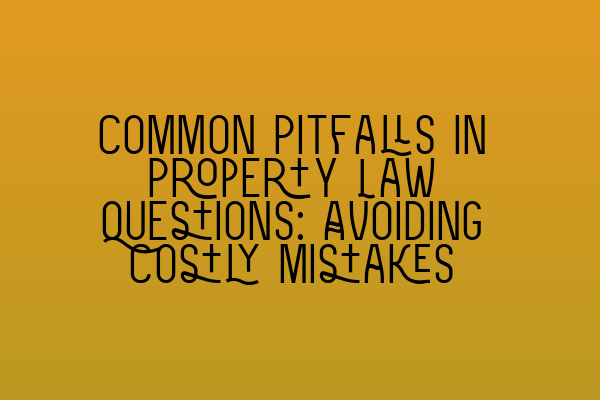Common Pitfalls in Property Law Questions: Avoiding Costly Mistakes
Welcome to the SQE Property Law & Land Law blog! As solicitors and experts in property law, we understand the complexities and challenges that can arise when dealing with property-related issues. Whether you’re a law student, a trainee solicitor, or even a practicing lawyer, it’s essential to be aware of the common pitfalls in property law questions to avoid making costly mistakes. In this blog post, we will explore some of these pitfalls and provide valuable insights to help you navigate property law effectively.
1. Lack of knowledge about property rights and obligations
One of the most common mistakes is failing to have a comprehensive understanding of property rights and obligations. Property law encompasses various aspects, including ownership, possession, mortgages, leases, and easements. Without a solid grasp of these concepts, it’s easy to make errors that can have significant legal and financial consequences.
For example, when advising clients on property transactions, it’s crucial to consider the rights and limitations of the parties involved. Understanding how contractual capacity works in property law is essential. Our related article on “Understanding Contractual Capacity: Rights and Limitations” provides in-depth insights into this topic and is a valuable resource to enhance your understanding.
2. Inadequate research and due diligence
Another pitfall is failing to conduct thorough research and due diligence. Whether you’re drafting a legal document or providing advice to a client, it’s vital to gather all the necessary information and undertake comprehensive research on the relevant laws and regulations. Failing to do so can result in errors or omissions that could lead to disputes or even legal claims.
To avoid this mistake, it’s essential to stay up-to-date with recent changes and reforms in property law that may impact your clients’ interests. Our article on “Contract Law Reforms: An Analysis of Recent Changes” can provide you with valuable insights into the latest developments in contract law that may affect your property transactions.
Additionally, staying updated on legal webinars and expert guidance can further enhance your understanding of property law. We encourage you to join our SQE Contract Law webinars, which offer expert insights and guidance, enabling you to stay ahead in your practice. You can find more information on our “Join Our SQE Contract Law Webinars: Expert Insights and Guidance” article.
3. Neglecting to review and analyze the documentation carefully
It’s crucial to review and analyze property-related documentation with great attention to detail. A common mistake is overlooking important clauses, terms, or conditions that may have a significant impact on the legal rights and obligations of the parties involved. Failure to notice these details can lead to costly mistakes and potential disputes.
To avoid this pitfall, pay close attention to the rights and responsibilities of the parties in a contract. Our article on “Parties in a Contract: Rights and Responsibilities” provides a comprehensive analysis of this topic, equipping you with the knowledge to identify potential pitfalls and advise your clients effectively.
4. Ineffective communication and documentation skills
Effective communication and documentation are crucial in property law matters. Poorly drafted contracts, unclear instructions, or improperly worded communications can create confusion and lead to disputes.
Developing strong communication and documentation skills is essential to avoid these pitfalls. It’s crucial to be clear, concise, and precise in your written and verbal communications with clients, opposing parties, and other stakeholders. Pay attention to the structure, language, and tone of your written documents to avoid confusion or misinterpretation.
5. Failure to seek expert advice when needed
Lastly, one of the most costly mistakes in property law is failing to seek expert advice when needed. Property law can be complex, and there may be situations where you encounter issues outside your area of expertise. In such cases, seeking guidance from experienced solicitors or specialists in property law can save you time, money, and potential legal consequences.
Conclusion
Avoiding the common pitfalls in property law questions requires a comprehensive understanding of property rights and obligations, diligent research and due diligence, careful analysis of documentation, effective communication and documentation skills, and knowing when to seek expert advice. By being aware of these potential pitfalls and taking the necessary precautions, you can navigate property law successfully and avoid costly mistakes.
We hope you found this blog post insightful and valuable. If you’re interested in testing your knowledge of contract law, we invite you to try our interactive SQE Mock Tests for Contract Law. These tests are designed to help you practice and refine your contract law skills.
If you have any specific questions or would like further guidance on property law, please don’t hesitate to contact us at SQE Property Law & Land Law. We are here to support you and provide expert advice to assist you in your property law journey.
